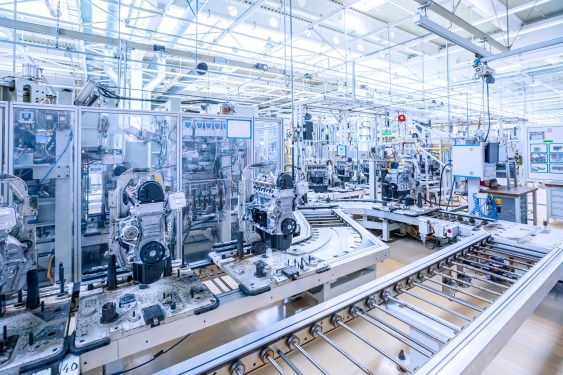Building Physical Tech is Back in Fashion Thanks to AI, Robotics, and Defense
Rebecca Bellan
Dec 18, 2024
The landscape of frontier technology has undergone a significant shift, with the interests of government and Silicon Valley increasingly aligning. A trend has emerged where dual-use startups initially focus on solving defense, infrastructure, or intelligence problems for the government before scaling up to offer these products to the public.
The Convergence of Government and Commercial Interests
Gilman Louie, co-founder of America’s Frontier Fund, shed light on this phenomenon in a recent Equity interview. "The advantage the government has is its problems," he said. "You know, you solve a big data problem in government, you probably solve a big data problem in the commercial world."
This convergence of interests between government and industry is not a new development. However, the current trend highlights the growing recognition that many of the complex problems faced by governments are also prevalent in the commercial sector.
The Role of AI, Robotics, and Defense in Reshaping Manufacturing
One area where this trend is particularly evident is in the realm of manufacturing. The integration of artificial intelligence (AI) and robotics has revolutionized the way products are designed, produced, and distributed. Startups that have successfully leveraged these technologies to address government contracts have found it easier to scale up their offerings for commercial markets.
The intersection of AI, robotics, and defense is also driving innovation in areas such as supply chain management, logistics, and cybersecurity. These advancements have the potential to transform industries beyond manufacturing, including healthcare, finance, and education.
Silicon Valley’s Embrace of Defense Technology
Silicon Valley has traditionally been associated with cutting-edge technology innovations, but a new wave of startups is now emerging that are focused on defense-related technologies. This shift reflects the growing recognition that many of the challenges facing governments can also be addressed through commercial solutions.
The advantages of embracing defense technology are numerous. For one, it provides access to significant funding and resources, which can be leveraged to drive innovation and scale up products for commercial markets. Additionally, working with government agencies can help startups develop expertise in areas such as cybersecurity, data analytics, and artificial intelligence.
Challenges Facing Founders Seeking Government Contracts
While the advantages of pursuing government contracts are clear, founders also face significant challenges when navigating this space. One major hurdle is the complexity of the contracting process, which can be daunting even for experienced entrepreneurs.
Another challenge is the need to balance competing priorities between meeting government requirements and delivering commercial-grade products. Founders must navigate a multitude of regulations, standards, and certification processes while ensuring that their solutions meet the needs of both government agencies and commercial customers.
The Future of American Leadership in Tech
As we look ahead to 2025, Gilman Louie shares his predictions for the trends that will shape the tech industry. He emphasizes the importance of startups in driving innovation and transforming industries such as manufacturing, healthcare, and education.
Louie also highlights the need for greater collaboration between government agencies, industry leaders, and academia to address complex challenges facing society. By fostering a culture of innovation and risk-taking, we can unlock new opportunities for growth, job creation, and economic development.
The Role of Startups in Shifting American Leadership
Startups play a critical role in shifting American leadership from the digital world back into physical manufacturing. By leveraging AI, robotics, and defense technologies, startups are helping to revitalize domestic industries such as aerospace, automotive, and textiles.
This shift has significant implications for the future of work, with many experts predicting that automation will create new job opportunities in areas such as data analysis, cybersecurity, and artificial intelligence engineering.
Conclusion
The intersection of AI, robotics, and defense is transforming the tech industry, driving innovation and growth in areas such as manufacturing, healthcare, and education. As we look ahead to 2025, it is clear that startups will play a critical role in shaping the future of American leadership.
By embracing the challenges and opportunities presented by government contracts, entrepreneurs can unlock new markets, create jobs, and drive economic development. As Gilman Louie so aptly put it, "The advantage the government has is its problems." By solving these problems through innovation and collaboration, we can build a brighter future for all.
Additional Resources
- Silicon Valley’s Deep Roots in Defense Tech: Explore the history of Silicon Valley’s involvement with defense technology and how this has shaped the industry today.
- The Advantages and Challenges Facing Founders Seeking Government Contracts: Learn more about the benefits and drawbacks of pursuing government contracts and how to navigate the complexities of this space.
- The Role of Startups in Shifting American Leadership: Discover how startups are driving innovation and transformation in industries such as manufacturing, healthcare, and education.
Listen to the Full Episode
To delve deeper into the conversation with Gilman Louie, listen to the full episode of Equity Wednesday. You can also subscribe to our podcast on Apple Podcasts, Overcast, Spotify, or your preferred platform.
Follow Us on Social Media
Stay up-to-date with the latest news and trends in tech innovation by following us on X and Threads at @EquityPod. For a comprehensive archive of episode transcripts, visit our website.
About the Author
Rebecca Bellan is a Senior Reporter at TechCrunch, covering transportation and related topics such as micromobility, EVs, AVs, smart cities, AI, and sustainability. She has previously written for Forbes.com, Bloomberg CityLab, The Atlantic, The Daily Beast, Mother Jones, i-D (Vice), and more.




